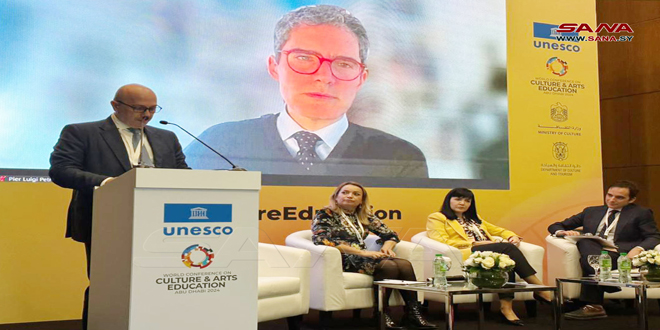Syria Trust for Development discusses integrating intangible cultural heritage into education during a UNESCO conference in UAE
Abu Dhabi (ST) – The Syrian Trust for Development, in cooperation with the UNESCO Chair on Intangible Cultural Heritage and Comparative Law, University of Rome Unitima Sapienza – Italy, organized an interactive dialogue session entitled (Integrating intangible cultural heritage into education… New Experiences and Horizons) that brought together experts from Africa, Latin America, Asia and Europe.
The event was held on the sidelines of the World Conference on Culture, Arts and Education recently organized by UNESCO at Abu Dhabi National Exhibition Center.
Member of the Syria Trust’s Board of Trustees Fares Kallas said during the session: “The discussion on integrating intangible cultural heritage into education is closely related to the UNESCO conference and to the societies from which we come and serve, specifically in a rapidly changing world, where the digital age and globalization produce opportunities and challenges.”
He added that the importance of protecting intangible cultural heritage is more urgent than ever, and our collective responsibility extends beyond preserving knowledge, to ensuring the transmission of knowledge, skills and practices that define the spirit of societies, and education becomes the cornerstone of this endeavour.
Kallas wondered about the possibility of improving educational methods to effectively protect intangible cultural heritage, pointing out that “a crucial aspect is a careful understanding of the fact that different contexts require different approaches”.
“In such interactive dialogues, we look forward to learning about the unique perspectives shaped by the history of countries, the traditions of their people, and their contemporary challenges.”
Kallas stressed the importance of awareness about the collective responsibility we bear, and by understanding the diverse perspectives and experiences shared in such interactive sessions, we pave the way for a more comprehensive, informed and flexible approach to intangible cultural heritage in education.
It is noteworthy that the UNESCO conference brought together ministers of culture and education from all over the world with the aim of adopting the UNESCO framework for culture and arts education and working to unite relevant UN agencies, intergovernmental organizations, UNESCO networks and partners in the field of culture and education to exchange innovative practices and ideas, as well as strengthening the global alliance for culture and arts education. .
UNESCO Member States unanimously adopted a new global framework for culture and arts education and made several commitments, including a commitment to strengthen the priority of culture and arts education in teacher training, to place greater emphasis on local and indigenous cultures in education, and to improve the recognition of artistic and cultural skills in professional settings.
Najla Khoury

